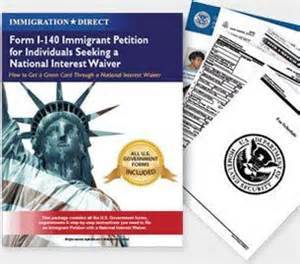National Interest Waiver: You May Be Surprised
Does the National Interest Waiver (a self-sponsored green card application) require that you be working for or funded by the US Government? The short answer is no, it most certainly does not.  Is it as hard as the Extraordinary Ability application? Again, the short answer is no, definitely not. The National Interest Waiver is actually a very appropriate application for many researchers and others who either cannot be or do not want to be sponsored by their employers. It allows you to sponsor yourself, and to change jobs and employers fairly easily throughout the process.
Is it as hard as the Extraordinary Ability application? Again, the short answer is no, definitely not. The National Interest Waiver is actually a very appropriate application for many researchers and others who either cannot be or do not want to be sponsored by their employers. It allows you to sponsor yourself, and to change jobs and employers fairly easily throughout the process.
So what are the actual qualifications for this application and how do you show your work is in the national interest? Unfortunately, this is a case in which both Congress and USCIS did not issue any guidance as to what the standard should be, so it was left to the courts. Specifically, the Administrative Appeals Office (AAO), in a precedent case (Matter of New York State Department of Transportation, 22 I&N Dec. 215 (Comm. 1998)(NYSDOT)) did explain what is needed to show that your work is in the national interest. After the AAO issued this decision, USCIS formally adopted the decision as their standard.
The NYSDOT case laid out a three part test to determine if your work is in the national interest: 1) you must be seeking work in an area that has substantial intrinsic merit; 2) you must demonstrate that the proposed benefit to be provided by your work will be national in scope; and, 3) you must demonstrate that it would be contrary to the national interest to potentially deprive the prospective employer of your services by making your position available to US Workers. While the above can seem daunting in theory, it is not quite so daunting in practice. What it comes down to is showing you are, and will be, working in an important area and that you have already made a significant impact on your field. What type of documentation can show this?
If you are a scientist you can show this through publishing and presenting your work, citation history, peer reviewing, being accepted for oral presentation or invited to talk, having a paper highlighted at a journal website or elsewhere, having press about your findings. Please note, the above is a list of documents that CAN be used to show eligibility, and it is not a list of ALL documents that are needed, as you can be approved with less than all the above documents. In fact, many of our clients may have 30-50 citations total, they may have anywhere from 2-5 papers, or more. Sometimes they have peer reviewing activities, sometimes they do not. Sometimes they have oral presentations, sometimes not. Every case is different and has to be judged on the totality of the evidence to show whether the evidence shows that the impact of your work has been substantial.
For areas other than the sciences, such as foreign relations, health policy, etc, while the type of documentation can be much the same as above – publications, press, etc, you also have the opportunity to look at your role within projects, programs, or other initiatives. It can also be much more letter focused with letters from government officials or NGOs about the use and implementation of your work, etc. It all depends on whether your work is more academic related or applied in the field.
In essence, US interests are broad in nature, and thus, depending upon the extent of your standing within a specific area, you may very well be a good candidate for this type of visa application.
Please remember, always get your legal advice from an attorney and not a blog. Call and talk to an attorney to get the specifics of this application and your ability to qualify.